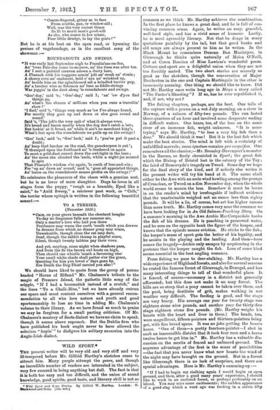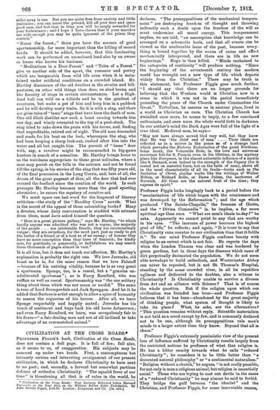WILD SPORT.* THE present writer will be very old and
very stiff and very Ill-tempered before Mr. Gilfrid Hartley's sketches cease to attract him. Many people attempt the genre, and though an incredible number of readers are interested in the subject, very few succeed in being anything but dull. The fact is that it is both too easy and too difficult, and the union of sound knowledge, good spirits, good taste, and literary skill is not so
Wad Sport and S.,me Stories. By Gilfrid W. Hartley. London : W. Blackwood and Sons. 1.15s. net.]
common as we think. Mr. Hartley achieves the combination. In the first place he knows a great deal, and he is full of con- vincing common sense. Again, he writes an easy, graceful, well-bred style, and has a vivid sense of humour. Lastly, he is most agreeably literary. Not that he drags in many quotations painfully by the tail, but that good books and old songs are always present to him as he writes. In the Black Mount he remembers Duncan Ban Macintyre, in Glenveagh he thinks quite naturally of Moira O'Neill,
and at Corea Bascinn of Miss Lawless's wonderful poem. Culture and sport are a delightful union when they are not too forcibly mated. The two short stories are scarcely so good as the sketches, though the conversation of Major Brotherton in the one and Captain Martingale in the other is
immensely amusing. One thing we should like to know. Did not Mr. Hartley once write long ago in Maga a story called "The Factor's Shooting"? If so, has he ever republished it, and, if not, why not ?
The fishing chapters, perhaps, are the best. One tells of the capture with a prawn on a wet July morning, on a river in Norway, of a salmon of fifty-two pounds. The run lasted three-quarters of an hour and involved some desperate wading in difficult waters. One hears, too, of the loss on the same river of an immense fish, weight unknown. "It is more trying," says Mr. Hartley, "to lose a very big fish than a deer." We should think it was ! But it is the lost fish which make the best stories. The mind is left with a certainty of unfulfilled marvels ; omne ignotum remains pro magnifico. One remembers all the classics ;—Mr. Bromley-Davenport's monster
in the Rauma„ so finely chronicled in Sport ; the great fish which the Bishop of Bristol lost in the estuary of the Tay ; the laird of Betnersyde's tragedy on Tweed. Some day we hope
for the final story of the kind, and if nobody else writes it the present writer will try his hand at it. The scene shall either be the Awe with an eerie wind howling among the prongs of Cruachan, or Tweed on a dim November day, when the whole world seems to mourn the loss. Somehow it must be borne in on the reader's mind by irrefragable if indirect evidence that the unattainable weighed not an ounce less than eighty pounds. It will be a lie, of course, but art has higher canons than mere truth. Mr. Hartley comes very near the romance we have been looking for in An Old Salmon-Poaching Story. On a summer's morning in the Awe Archie MacCorquodale hooks the fish of his dreams. He is poaching in preserved water, and he sees on the opposite bank the figure of the keeper, and knows that the episode means eviction. He sticks to the fish ; the keeper's sense of sport gets the better of his legality, and he assists in the playing and the landing. And then—here conies the tragedy—Archie only escapes by acquiescing in the pretence that the keeper caught the fish. Loss of some kind seems essential in the best angling romance.
From fishing we pass to deer-stalking. Mr. Hartley has a wide experience of Highland forests, and also for several seasons he rented the famous forest of Glenveagb, in Donegal, and has many interesting things to tell of that wonderful place. It is fenced, of course—necessary in a district not generally afforested; but this does not make it an easy forest. The hills are so steep that a pony cannot be taken over them, and the peat, being destitute of grit, makes walking in wet weather very difficult. The feeding is good, and the stags are very heavy. His average one year for twenty stags was eighteen stone nine pounds, and another year for thirty-five stags eighteen stone five pounds. (Mr. Hartley weighs his beasts with the heart and liver in them.) The heads, too, were magnificent, fifteen-pointers and thirteen-pointers being got, with fine broad spans. It was no joke getting the beasts home. "One of them—a pretty fourteen-pointer—I shot in such an inaccessible district that it took four men and a horse twelve hours to get him in." Mr. Hartley has a valuable dis- cussion on the merits of fenced and unfenced ground. The supreme advantage of the first is the sense of possibilities —the fact that you never know what new beasts the wind of the night may have brought on the ground. But in a forest like Glenveagh there is no lack of surprises, and there are special advantages. Here is Mr. Hartley's summing-up :—
"If I had to begin my stalking again I would begin on open ground, and then, after a good many years' experience, I should like to work in an enclosed forest, or perhaps preferably on an island. You may miss some excitements ; the sudden appearance of a good stag which a week ago was feeding in a corrie fifty
miles away is one. But you are quite free from anxiety and little jealousies ; you can nurse the ground, kill off poor deer and spare good ones, and feel that in time you will be amply rewarded for your forbearance ; and I hope I have shown that if your marches are wide enough you may be quite ignorant of the prizes they contain."
" Nurse the forest ;" there you have the essence of good sportsmanship, far more important than the killing of record heads. It should be added, however, that this fascinating work can be performed on unenclosed land also by an owner
or lessee who knows his business.
"Meditations in a Deer-Forest" and "Tales of a Forest" give us another side of the sport, the romance and poetry which are inseparable from wild life even when it is main- tained under artificial conditions on a crowded island. Mr. Hartley discourses of the old dwellers in the straths and hill.
pastures, on other wild things than deer, on shed horns, and the ferocity of stags in certain circumstances. Let a High- land bull run wild on a hillside and he is the gentlest of creatures, but make a pet of him and keep him in a paddock and be will develop nasty traits. So it is with a stag, and there are grim tales of "tame" stags that have been the death of men. One old illicit distiller saw such a beast coating towards him one day, and wisely retreated to the top of a peat-stack. The stag tried to rake down the peats with his horns, and, finding that unprofitable, retired out of sight. The old man descended and made for his boat on the loch, whereupon the stag, who bad been keeping a sharp look-out, rushed after him into the water and all but caught him. The pursuit of " tame " deer with, say, a revolver might be recommended to big-game hunters in search of a sensation. Mr. Hartley brings home to us the weirdness appropriate to these great solitudes, where a man may perish on the hills in the autumn and not be found till the spring, in his stories of the stag that was fifty years old, of the final procession in the Long Corrie, and, best of all, the dream of the great pageant of deer, all the deer that had ever crossed the beallaeh since the creation of the world. In such passages Mr. Hartley becomes more than the good sporting chronicler ; he enters the mystery of creative art.
We must spare one last word for the fragment of literary criticism—the study of the "Handley Cross" novels. What is the secret of the appeal of those astonishing books ? Many a devotee, whose daily conversation is studded with extracts from them, must have asked himself the question.
"Here is a great picture gallery," says Mr. Hartley, "to which hardly anyone was admitted who was not a rogue; the majority of the pepple . . . are intolerable frauds; they are excruciatingly vulgar ; they are swindlers, for the most part just as ready to get the better of a friend or of a host as of an enemy ; of honour they have no more conception than they have of Sanscrit ; for kindly acts, for gratitude, or generosity, or faithfulness we may search these thousands of pages almost in vain."
It is all true, but it does not touch our affection. Mr. Hartley's explanation is probably the right one. We love Jorrocks, old beast as he is, for the same reason that we love Falstaff —because of his untiring vitality, because he is so very great a sportsman. Sponge, too, is a rascal, but a "genuine un- adulterated sportsman "; so is Facey Romford, who was ruffian as well as rascal. Sportsmanship was "the one solitary thing about them which was not mean or sordid." The same is true of Lord Scamperdale and Jack Spraggon. And let it be added that Surtees is artist enough to allow a spice of humanity to season the rogueries of his heroes. After all, we leave Sponge respectably and happily mated ; Jorrocks has his touch of sentiment and buys back his old horse Artaxerxes; and even Facey Romford, we learn, was scrupulously fair to his foxes—" a fair-dealing man and not at all inclined to take advantage of an overmatched animal."







































































 Previous page
Previous page